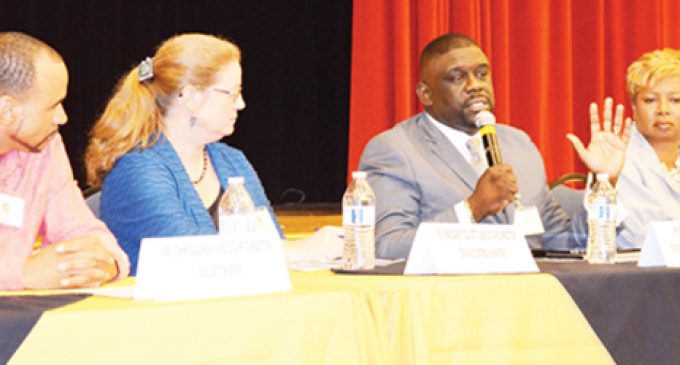Black lawmakers target poverty

(pictured above: Panelists (from left): John Gladman, Margaret Elliott, Minister Alvin Carlisle and Karen McNeil-Miller.)
Five decades after President Lyndon Johnson declared War on Poverty, the issue still plagues Winston-Salem and communities across the United States, despite its continued place among the richest nations in the world.
Leaders from across the community and state came together last week, to discuss the issue and create a plan of action to eradicate its presence in the local community during a forum convened by members of the North Carolina Legislative Black Caucus.
“We’ve reached out to the people and organizations that can really make a difference in our community. We are counting on you,” State Sen. Earline Parmon, vice chair of the NCLBC, told attendees at the April 4 event, which drew representatives from dozens of local agencies. “…I heard someone say it couldn’t be done, but I’m here to tell you if we join forces together, it can be.”
The event, which was held at the Anderson Center on the campus of Winston-Salem State University on the 46th anniversary of Dr. Martin Luther King Jr.’s assassination, was part of a tour Caucus leaders are embarking upon to establish coordinated efforts to eradicate poverty statewide.
“This is not a listening tour. This is about action, and action now,” declared Rep. Garland Pierce, NCLBC chairman. “If ever there was a time that we need to be concerned about poverty, the time is now.”
The forum featured a panel discussion with Mayor Allen Joines, Rev. Kelly Carpenter, Minister Alvin Carlisle, Margaret Elliott, John Gladman and Dr. Karen McNeil Miller.
“Fifty years ago, the War on Poverty was declared and today, we’re declaring the War on Poverty failed,” Joines said, noting that the latest Census report found that 22 percent of U.S. residents live in poverty. “…Poverty levels are as high ,if not higher, than they were in 1964.”
Forsyth County has the dubious distinction of being home to the highest poverty rate among urban North Carolina counties, noted Gladman, the assistant director of the Salvation Army, which provides shelter and services for some of the area’s most needy families.
Joines is on the cusp of waging his own war on poverty, through a collaborative initiative he’s calling a “thought force.” Slated to launch in the spring, the effort will call on community stakeholders to spend several months delving into poverty and its causes. They will generate realistic strategies based on what they learn and “connecting the dots” to create a Poverty Reduction Community Action Plan within the next two years, the mayor said.
“We’re about ready to kick this thing off, and I think we’re going to have some good results,” the mayor declared, adding that he wants every local leader to make poverty reduction a chief priority.
“If we could get our mindset going in that direction, I think we could begin to make some progress,” he said.
Since its inception in 1947, the Kate B. Reynolds Charitable Trust has invested over $80 million to support the poor and needy in the local community, said McNeil-Miller, the organization’s president. But, philanthropy alone is not enough to solve the issue of poverty, she said. Without the support of the government and other partnerships and initiatives, philanthropic investments are as effective as “throwing a thimble full of water on a raging fire,” McNeil-Miller said.
When it comes to ending poverty, those who know it best must be partners in the effort, McNeil-Miller said.
“You have to be very resourceful to be poor,” she observed. “…They have great assets; they know how to put two and two together and make eight, and we need to exploit that as part of our solution.”
In a time where many societal ills – including poverty – are exacerbated by moral issues such as “the breakdown of the family structure,” the faith-based community is uniquely positioned to address the effects of poverty, said Carlisle, the pastor of Exodus Baptist Church.
“The faith family has always been a major vehicle for moving the minds of the masses, to elevate their decisions to think in another way,” he stated. “…Oftentimes, we neglect to be that stopgap provision for those who are in poverty.”
Carpenter, who helms Green Street United Methodist Church, briefly explained the Circles project, a new initiative of the Shalom Project, a nonprofit he established a decade ago. The project, which has been implemented in communities across the nation, seeks to demolish some of the obstacles people living in poverty face in trying to overcome their situation, he explained.
“Poverty is not just about a lack of resources. It’s also a lack of relationships,” Carpenter said. “…The Circles initiative is designed to actually give new relationships, to provide a circle – or actually a network – of support. The Circles approach is about trying to build social capital for people who live in poverty.”
Parmon deemed the more than two hourlong session a successful step in the march towards ending poverty for good.
“This has been a great opportunity,” Parmon told attendees at the culmination of the gathering. “Together, we truly, truly can make a difference in this city.”
For more information on the NCBLC’s war on poverty, visit http://nclbc.com or find them on Facebook.















